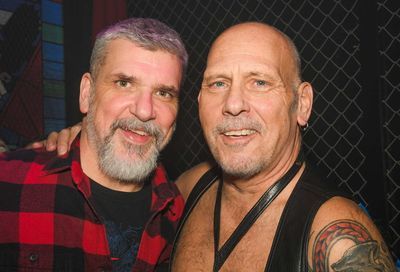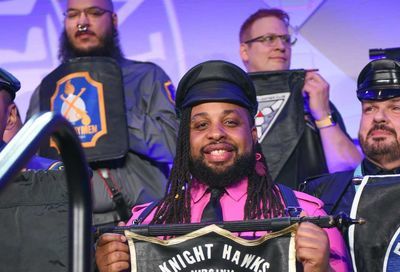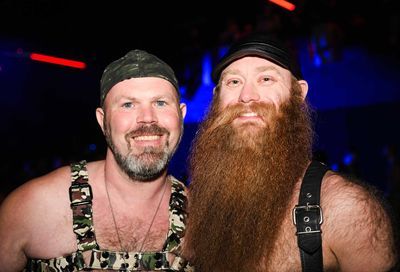Born Again
Is Cloning the Key to Gay Reproduction?
Photography by Michael Wichita
 |
In many ways, December 27 was a bigger day for the tabloids than the medical community. The news of the world’s first cloned human being couldn’t have been better packaged for an eighty-point headline. Speaking at an invite-only press conference at a Holiday Inn in Hollywood, Florida, a makeup-caked woman named Brigitte Boisselier announced that a company called Clonaid, funded by a Miami Beach cult of UFO-worshippers who refer to themselves as Raelians, had cloned a baby girl who — presumably to maximize Christian outrage — was to be known as “Eve. ”
The cloning story couldn’t get any better. Then one week later, it did, when Clonaid announced a second birth, this time to (gasp!) a lesbian couple in the Netherlands. Clonaid again declined to offer any proof of their claims, citing concern for the couple’s privacy. As more time has passed, even pro-cloning advocates are beginning to suspect they’ve been had.
For the gay community, at issue is not so much whether this particular claim is a hoax. Nearly everyone agrees that, if it hasn’t been born already, the first human clone is fast approaching. On the cover of its February 2001 issue, WIRED magazine predicted that “Someone Will Clone a Human in the Next 12 Months, ” citing “desperate souls ” in “renegade labs ” as the most likely source.
|
While human cloning will impact the whole world, it will affect gay and lesbian people uniquely. A clone born to a same-sex couple will be the first baby ever created outside the realm of heterosexuality. Currently, gay and lesbian couples who want to bear a child must enlist a third party of the opposite sex to contribute sperm or an egg. With cloning, this will no longer be necessary.
“Cloning renders heterosexuality’s monopoly on reproduction obsolete, ” said Randolfe Wicker in the April/May 1997 issue of Heterodoxy. Wicker is gay and founder of the pro-cloning advocacy group Clone Rights United Front (CRUF). He believes cloning is the key to the gay community’s future.
“A new religion, ” Wicker has predicted, “will grow from this. ”
The Original Replica
On February 24, 1997, the world met its first clone. Dolly, a sheep at the Roslin Institute in Edinburgh, had been born an identical twin to its mother through the process of cloning. The moment he heard the news, Wicker called his friend Jack Nichols, editor of GayToday, an online publication.
“I want to be cloned! ” Wicker said, believing that his dream of reproducing was suddenly one step closer.
“I remember saying to Randy, ‘You know what this means? This means that some of the desire to unsettle the nuclear family has been given a boon,’ ” says Nichols. “‘Now you can raise your own father.’ ”
Statements like that have not sat well with the public, and some pro-cloning activists have found that the more they advocate, the more ground they lose. When interviewed by GayToday, Wicker asked, “If you’re going to spend 21 years [raising a child] and give it a college education, are you really going to settle for what pops out of the womb? ” adding that, “We all know people who have had kids that were real, pardon the term, fuckups and losers. ”
Nevertheless, Wicker isn’t the type to shy away from controversy. Three days after Dolly was introduced, he had CRUF up and running, and was already trying to convince the gay community that cloning was a gay issue. On March 1, 1997, he and fifteen others — mostly queer — marched in Greenwich Village to protest New York Senator John Marchi’s effort to make cloning a Class D felony.
Among those marchers: Silvia Rivera, famous for her role in the Stonewall riots. As Rivera was leafleting prior to the march, an angry crowd of gays and straights confronted her. A few spit at her, and someone threw a beer can.
The crowd’s actions were telling. To Wicker, cloning had immediately seemed like a gay issue by its very nature. But it soon became clear that the gay community wasn’t going to automatically take on another socially divisive cause. With the liberation movement becoming more assimilation-oriented each passing day, the cloning issue didn’t seem to jibe, and it quickly fell off the community’s radar.
The Case for Cloning
“Some people, homosexual and heterosexual, go through life and don’t meet anyone who they feel is fit to be the co-parent of their child, ” says Wicker. “You can go to the sperm bank and pick someone with great credentials — certainly that’s better than the old fashioned way — but that sperm might have that one recessive gene that results in cystic fibrosis. ”
Wicker’s dismissal of “the old fashioned way ” may sound shocking, but no more so than in vitro fertilization sounded when it was first performed, to the horror of many, in 1978.
“They had just begun an eight year study of IVF when little Louisa Brown was born, ” he says. “People thought these children would be deformed, they thought they’d be monsters. And then everyone discovered they were just children. ”
Human cloning will follow the same path, say advocates. What seemed appalling fifty years ago — casual drug use, sex on TV, gay rights — today feels fairly routine. And as has been pointed out by many pro-cloners, a culture that encourages its scientists to develop nuclear weapons sounds pretty hypocritical moralizing against technology that actually creates life.
“You can’t argue that it’s better not to be born at all than to be born through cloning, ” says Wicker, turning the conservatives’ “Right to Life ” platform on its head. “‘Wrongful Birth’ has never been vindicated. ”
Most people agree that keeping cloning illegal won’t prevent it from happening, and that legalization and regulation could prevent “back alley ” cloning attempts. But the argument that pro-cloners hope will ring true with gays and lesbians is based on the theory that preemptively labeling something as “wrong ” lays the foundation for discrimination.
“Even if human cloning is not desirable in light of society’s present-day values, ” reads a report prepared by The President’s Council on Bioethics in favor of cloning,
“Â…banning cloning today will set a dangerous precedent that future cloned people are unequal, undesirable, and lack equal civil rights. It will establish an unnecessary legacy of discrimination. ”
Concerns about clone discrimination intensify when one considers the idea of clones born to gay parents. Many scientists believe that genetics play at least a partial role in sexual orientation. If this is true, clones born to gay parents would be more likely to turn out gay themselves.
“There’s a lot of research being done, ” says Thomas Kaenzig, Vice President of Clonaid and a Raelian priest. “From what we believe, [homosexuality] is partly in our genes, so a cloned baby could be gay if it expresses those genes. ”
If cloning could potentially pinpoint a “gay gene, ” Wicker is all for it. He dismisses the argument that locating such a gene would lead parents to abort gay children.
“Right now you can have prenatal tests done for over twenty diseases, but people don’t have them done, ” he says. “They cost thousands of dollars, and people don’t think in terms of their unborn kid being homosexual.
“Besides, ” he continues, “the people who would be most likely to abort a gay child think that homosexuality is a choice. They’ll think, ‘We have a nice Christian home. Our child won’t grow up to be one of those sodomites.’ ”
Lost in the Male
 |
“I’m not looking to immediately eliminate men from the earth, ” said Ann Northrop, co-host of the TV program Gay USA, in an interview with Heterodoxy in 1997. A lesbian activist, feminist and former columnist for the now-defunct New York gay newspaper LGNY, Northrop’s musings on what cloning could mean for the male race have gotten her into hot water before. The Associated Press quoted her as saying that “men are now totally irrelevant, ” and sent her words around the world.
“If cloning is, in fact, true, men are going to have a very hard time justifying their existence on the planet, ” she said. “Essentially, this is sort of the final nail in men’s coffins. ”
When those words are read back to her today, Northrop laughs, “You say something like that and it’s going to get reprinted everywhere.
“I think the point is that women become less dependent on men, ” she clarifies. “Women could use this as a way of forcing straight men to cut out their [power mongering]. I think anything that shifts the power balance is a good thing. ”
In the future, men may be able to clone themselves without women through the use of artificial wombs. As it stands, however, an egg can be made “male ” by removing the nucleus of a female egg and replacing it with a sperm cell, but a surrogate mother is still needed to carry the cloned baby to term. Because of this, men still need women in the cloning process, but women do not need men.
It’s unlikely that most heterosexual women imagine their utopia to be exclusively female, so Northrop’s predictions will probably not come true, cloning or no. And Northrop believes that cloning is just as important to gay men as it is to lesbians.
“The only reason cloning would be more important to lesbians is if lesbians are more inclined to want children, ” she says. “As this becomes more available, I would guess more men would want children also. ”
But pro-cloning activists like Northrop may overestimate public enthusiasm. A 2001 ABC News poll indicated that eleven percent of Americans think cloning should be legal. But that doesn’t mean they would all necessarily want a clone of themselves. Ellen Kahn, Director of the Lesbian Services Program at Whitman-Walker Clinic, conducts a program called Maybe Baby, a service for lesbians considering parenthood.
“We really encourage folks to explore why they may be so focused on trying to have some kind of biological connection, ” says Kahn, pregnant with her second. “What we find is that the connection is incredibly intense between the child and the non-bio parent. ”
“If there were a simple, noninvasive way that two men or two women could merge their genetic makeup, ” she continues, “then why not? But things like IVF and cloning are astronomically expensive and, perhaps, not scientifically sound. ”
Local lesbian mom Jessica Wodatch agrees. She and her partner have a son who was conceived through an anonymous sperm donor. Wodatch says the boy’s genes have “no bearing ” on their relationship with him.
“I think it’s pretty weird, ” she says of human cloning. “I guess it would be interesting to see what someone with your exact same genetic code would be like, but not interesting enough to actually do it. ”
The Raelians Clone Home
Not helping to diminish the weirdness factor at all is the space creature connection.
Raelian creationist history holds that human beings were created by alien scientists whom Rael, the founder of the movement, claims to have been contacted by in 1973. The Raelians are currently making plans to break ground on an intergalactic embassy here on earth so the aliens who created us will feel comfortable about returning.
Cloning is just the first step in a much larger Raelian scheme. Once human clones become the norm, each Raelian will start cloning him or herself near the end of his or her life, and then grow their baby clone to the age of 18 in a matter of five hours using a technology called “accelerated growth process. ” Once their clone is 18, the older, dying Raelian will download all the contents of his or her mind into the young clone, effectively starting life over again with the same mind but in a younger body. Performed as an endless cycle, they claim this process will allow them to live forever.
Raelian philosophy welcomes all sexualities. It’s estimated that approximately six percent of its members are gay.
“We don’t like the word ‘tolerate.’ We celebrate different sexual orientations, ” says Pierre-Paul Bourque, a gay French-Canadian Raelian priest who lives on the outskirts of Ottawa.
|
Bourque predicts that the Raelian plan for eternal life through cloning, which will render sexual orientation obsolete, will be a windfall for the gay rights movement.
“In our philosophy, ” says Bourque, “we develop our sensuality. Raelians are always touching and hugging and kissing because there’s a love between us. It doesn’t matter what your sexual orientation is. ”
Predictably, the vast majority of pro-cloning advocates want nothing to do with the Raelians.
“These people, they’re exploiting cloning to promote themselves, ” fumes Wicker, clearly agitated.
“No one wants to be associated with them, ” insists Northrop. “We need to just swallow hard and deal with the real issue. ”
And while most major gay organizations have clammed up on the cloning issue anyway, the Raelian connection certainly isn’t going to draw them out.
“We haven’t taken a position on this issue, ” says David Smith, Communications Director for the Human Rights Campaign. “Frankly, it seems like science fiction. ”
Unfortunately for those who would like to see cloning taken seriously, Clonaid is headed by Raelians who appear to be using the company as a mouthpiece for their philosophy. This has only fueled suspicions that their unsubstantiated claims are a publicity stunt. If that’s the case, it’s working — Bourque reports that Raelian membership is up ten percent since the group claimed Eve was cloned.
The Next Generation
“I maintain that every human being has the right to reproduce, ” declares Wicker. “The world is changing. Open adoptions, domestic partnerships — we’re developing new types of relationships. ”
After Dolly was unveiled, a push to ban human cloning was attempted in Congress, but the effort stalled. Last week, however, on January 8, the bill was reintroduced at a Capitol Hill press conference by pro-life Representatives Dave Weldon (R-FL) and Bart Stupak (D-MI) to the tune of 87 cosponsors.
“Human cloning is baby manufacture, ” said Weldon. “Any attempt at human cloning, for whatever purpose, is a gross form of human experimentation that the American people oppose. ”
“What is the right wing’s objection? ” asks Northrop. “Is it that we should have control over our own reproduction? ”
The debate vaguely mirrors the gay community’s “privacy of your own bedroom ” issue. Despite this, many gays and lesbians still regard human cloning as unnatural, a viewpoint that Wicker flatly rejects.
“Life began with a cell splitting in two, ” he says. “If you take a cutting off a rose bush and stick it in the ground, it grows roots and becomes another plant. That’s cloning. ”
But all of the rationalization in the known universe isn’t changing the simple fact that the idea of human cloning gives the average person the heebie jeebies. Still, CRUF and pro-cloning advocates plan to keep soldiering forth.
“As people learn more about it, they’ll relax and realize that it’s not the end of the world, ” says Northrop. “It’s perfectly natural in the sense that anything we create is natural. Airplanes are manufactured, too, but that doesn’t stop us from flying. ”
Support Metro Weekly’s Journalism
These are challenging times for news organizations. And yet it’s crucial we stay active and provide vital resources and information to both our local readers and the world. So won’t you please take a moment and consider supporting Metro Weekly with a membership? For as little as $5 a month, you can help ensure Metro Weekly magazine and MetroWeekly.com remain free, viable resources as we provide the best, most diverse, culturally-resonant LGBTQ coverage in both the D.C. region and around the world. Memberships come with exclusive perks and discounts, your own personal digital delivery of each week’s magazine (and an archive), access to our Member's Lounge when it launches this fall, and exclusive members-only items like Metro Weekly Membership Mugs and Tote Bags! Check out all our membership levels here and please join us today!

























